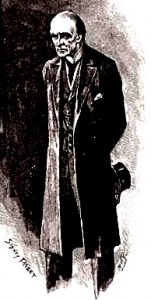
Sherlock Holmes had Moriarty, Superman had Lex Luthor and so on – right down through the inevitable spill-over into the movies and television, with Jethro Gibbs facing terrorist Ari Haswari and Harry Potter facing dead megalomaniac, Voldemort.
The “arch” in arch enemy actually originates from the Greek “arkhos”, meaning “paramount”. Arch villains are supposed to be the most important fly in any hero’s ointment: And here’s why.
A true arch enemy in fiction…
- Matches the hero in intelligence
- Provides a mirror (the hero’s dark side)
- Is both psychopathic and narcissistic
- Is always diabolically clever
- Is evil incarnate
The trouble is, an arch enemy (rather than a mere antagonist) can all too often be called:
- A plot device for when stories or episodes are beginning to grow stale and boring
- Predictable (yawn)
Hey, there’ s no mystery about the fact that whenever Moriarty turns up in a Sherlock Holmes tale (or TV episode), he is going to totally oppose Holmes in a very personal – and evil – way. And all of a sudden, the little people we care about in the story don’t matter. It’s all about Holmes and Moriarty.
And that’s why, for me, arch villains ultimately fail in literature and film.
The arch villain/personal nemesis is never greater than the sum of his purpose – a plot device to provide conflict – often when a book series (or movie series) is flagging. Arch villains can also be a writer’s greatest self-indulgence or weakest creation. In fact, part of the fascination with creating arch enemies might lie in the fact that the writer gets to “explore” evil and stretch their own human experience.
But the main reason that the Gibbs-Hawari, Director Jenny-LaGrenouille, Holmes-Moriarty type of arch nemesis tends to bore me is that I don’t find it believable they would assign the hero that much power; would make it personal.
Face it…
“People are just not important to psychopaths”
That’s why real ones are truly chilling. Real arch villains see people as either obstacles or objects – never as individuals. Hitler saw so-called ethnic minorities as obstacles in the way of his schoolboy Aryan Knight fantasy. Paul Bernardo saw his victims as objects to gratify his sadistic impulses. And the worse arch villains are all too often rarely recognized – such as the husband who abuses his wife at first in small ways, until she no longer has self-esteem enough to protest against steadily escalating abuse that becomes truly appalling behind closed doors. This type of narcissistic psychopath impression-manages all around her with wit and charm, so that the wife is not believed when she finally attempts to seek help or tell the truth.
Or the kindly uncle who sexually abuses his favorite niece, silencing her with a subtle mix of threats, guilt trips and presents.
Or big corporations like Monsanto, taking over the earth with money and mergers.
Or Donald Trump; the only truly chilling cartoon-style arch villain out there, currently masquerading as a white knight in an eerie echo of early Adolf Hitler.
But we’re getting too dark here. Let’s get back to our fictional arch villains. Their predictability has actually turned the whole arch-villain trip into a genuine, one dimensional, twenty-first century cliché, goatee and all.
“Selfishness is the new ‘evil'”
Get rid of the “arch”. Make your villains realistic. True villains – the really clever ones – are often incredibly likable; but the truly chilling factor that creates high-stakes conflict is that your true villain cares only about himself. And that’s when bad things start to happen to those around him or her. (Yes, Virginia: Selfishness is the new ‘evil’.)
Chuck out the “my hero’s personal nemesis” temptation, and you’ve got a complex human being (or Belorgian or Tremnops), with both good and bad character flaws, warped (tragically or otherwise) by his past and his obsessions.
Such a villain may be the antithesis of a genius mastermind. Pathetic, or clumsy – likable, even. He may be funny and make you laugh, or stir your sympathy (like Loki does, at times, in ‘The Avengers’). You may hate or despise him, or even secretly root for an antagonist and his twisted motivations, but ultimately his obsession or flaw will make him step over the line.
And that’s normal readers will sheer away. All of a sudden, you’ve got true, high-stakes drama.
There’s nothing clichéd about that.
Your favorite – or most hated – Arch Villain?
